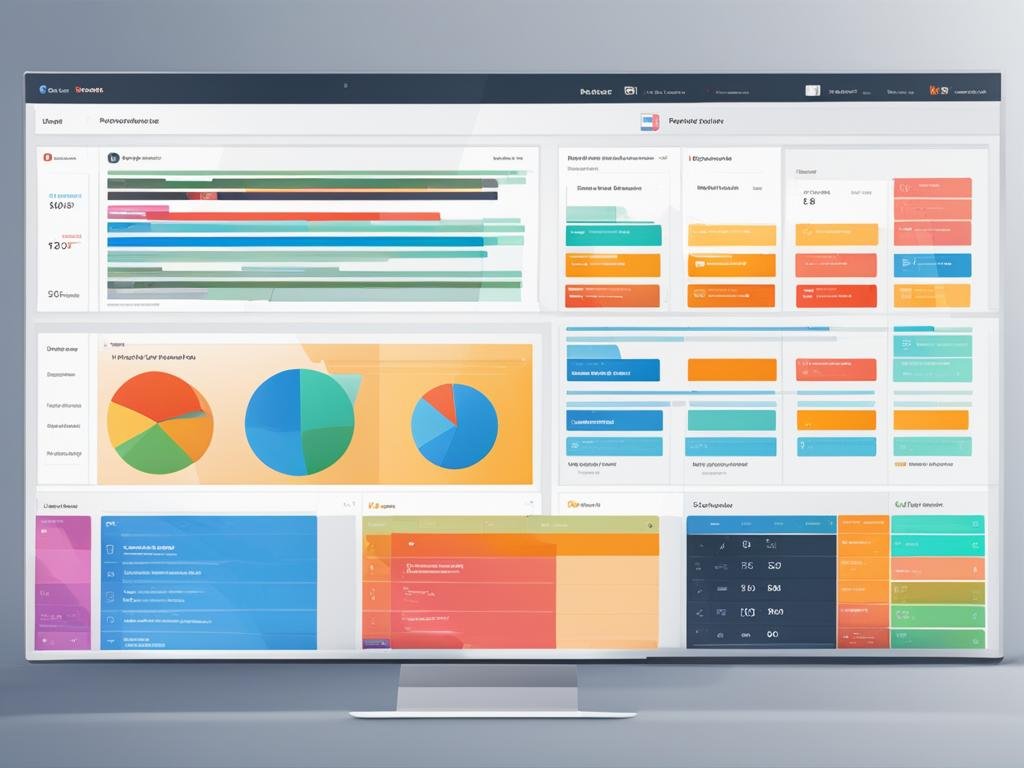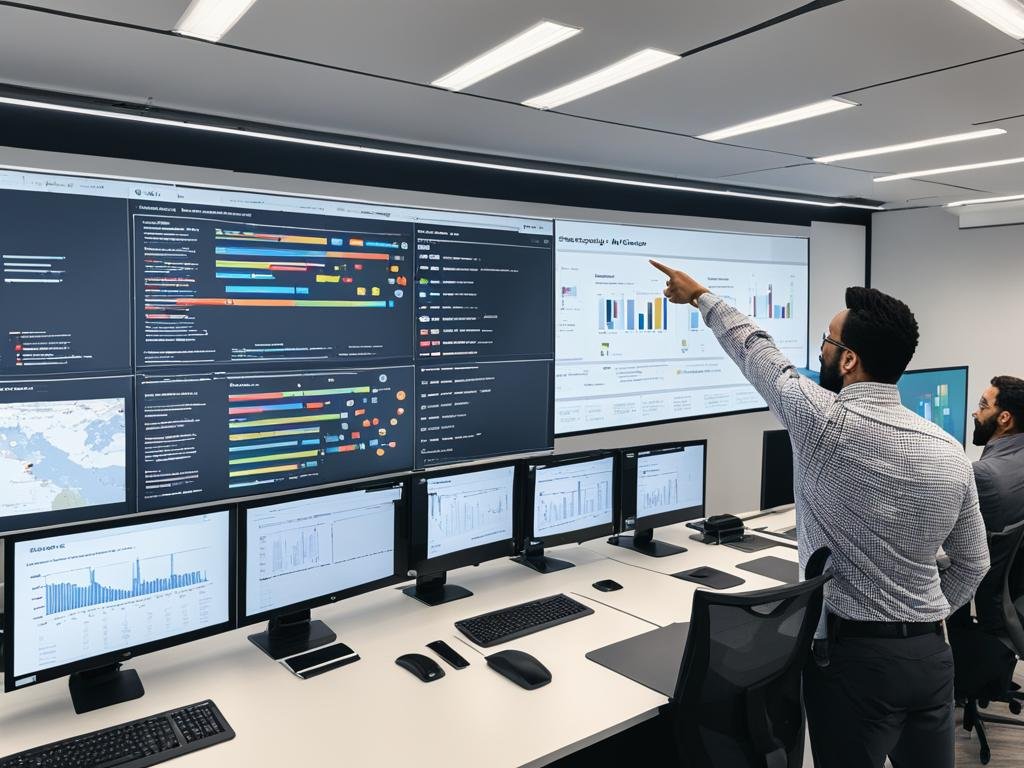A technical project manager plays a vital role in leading and executing complex technical projects. They are responsible for managing projects, coordinating teams, and ensuring the successful delivery of projects.
Technical project managers need to possess a diverse set of skills to excel in their role. This includes strong technical expertise, leadership abilities, effective communication skills, problem-solving capabilities, and team management skills.
Throughout this article, we will explore the demand for technical project managers, the responsibilities they hold, the skills required to become one, and the career growth opportunities in this field.
Key Takeaways:
- Technical project managers play a crucial role in leading and executing complex technical projects.
- They need to possess technical skills, leadership abilities, effective communication skills, problem-solving capabilities, and team management skills.
- The demand for technical project managers is high in various industries.
- Technical project managers oversee project delivery, coordinate teams, and ensure projects are completed on time and within budget.
- A combination of technical expertise and project management skills is necessary to become a successful technical project manager.
The Demand for Technical Project Managers
As technological advancements continue to shape the business landscape, the need for skilled technical project managers is on the rise. These professionals play a crucial role in leading and managing complex technical projects in various industries.
Technical project managers bring a unique set of skills and expertise to the table. They possess a deep understanding of agile methodology, which allows them to effectively navigate the dynamic nature of software development projects. With their mastery of budgeting and forecasting, they ensure projects stay on track financially, delivering value to stakeholders.
Having a strong background in project management is essential for technical project managers. Their project management experience enables them to oversee teams, allocate resources efficiently, and mitigate risks throughout the project lifecycle.
“The demand for technical project managers is fueled by the ever-growing reliance on technology in today’s business environment. These professionals are adept at leading technical teams and delivering successful projects.”
Technical project managers are sought after by organizations across various industries, including IT, software development, finance, and healthcare. Their ability to translate complex technical requirements into actionable project plans makes them indispensable assets to achieving business objectives.
| Key Skills | Description |
|---|---|
| Agile Methodology | Proficient in managing projects using agile principles and frameworks, ensuring iterative development and rapid delivery. |
| Software Development | Expertise in overseeing software development projects, collaborating with development teams, and ensuring high-quality deliverables. |
| Budgeting and Forecasting | Adept at budget management, tracking project costs, and forecasting financial resources required for successful project completion. |
| Project Management Experience | Proven track record of successfully managing projects, demonstrating skills in planning, organizing, and leading cross-functional teams. |
What Does a Technical Project Manager Do?
A technical project manager is responsible for overseeing and managing highly technical projects. Their role is essential in ensuring the successful delivery of projects on time and within budget. To effectively fulfill their responsibilities, technical project managers need to possess a deep understanding of project management principles, as well as strong management skills to coordinate and lead teams. Their ability to work collaboratively with technical teams and utilize project management software is crucial in achieving project objectives.
Key responsibilities of a technical project manager include:
- Creating and communicating project visions and goals
- Coordinating and overseeing project activities
- Managing project timelines, budgets, and resources
- Monitoring project progress and identifying risks
- Ensuring effective communication within the team and stakeholders
Technical project managers play a vital role in bridging the gap between technical expertise and project management. They understand both the technical aspects of a project and the methodologies required to successfully execute it.
Having a comprehensive understanding of project management software is essential for technical project managers to efficiently plan, execute, and monitor projects. These tools enable them to track progress, collaborate with teams, manage resources, and ensure the successful completion of projects.
The Skills Required for Technical Project Management
Technical project managers must possess a diverse skill set to effectively fulfill their responsibilities. Along with a solid understanding of project management principles, they need strong leadership and team management skills to motivate and guide their teams towards project success. Effective communication and problem-solving abilities are crucial for navigating challenges and ensuring smooth project execution.
Here is a breakdown of the key skills required for technical project management:
| Skills | Description |
|---|---|
| Technical Expertise | Deep knowledge and understanding of technical concepts relevant to the project. |
| Leadership | Ability to inspire, motivate, and guide teams towards project objectives. |
| Communication | Effective communication skills to convey project goals and requirements to team members and stakeholders. |
| Problem-Solving | Capability to analyze and resolve complex issues that may arise during the project lifecycle. |
| Team Management | Skills to collaborate, allocate resources, and delegate tasks among team members. |

Technical project managers leverage their understanding of project management principles and their technical expertise to guide teams and ensure successful project outcomes. Their ability to effectively manage projects, teams, and resources is crucial to meet project objectives and deliver high-quality results.
Skills Needed to Become a Technical Project Manager
Becoming a successful technical project manager requires a combination of technical expertise and project management skills. As a technical project manager, you must possess a strong understanding of technical concepts and be able to apply them effectively to manage complex projects. Here are the key skills that you need to become a proficient technical project manager:
1. Technical Expertise
To excel in this role, you must have a deep understanding of the technical aspects related to the projects you manage. This includes knowledge of software development methodologies, programming languages, infrastructure systems, and other relevant technical domains. Your technical expertise will enable you to make informed decisions, communicate effectively with your team, and overcome technical challenges that may arise.
2. Project Planning
The ability to develop comprehensive project plans is essential for a technical project manager. You must be skilled in defining project objectives, creating work breakdown structures, estimating effort and resources, and establishing project timelines. A well-designed project plan sets the foundation for successful project execution and helps keep the team aligned and focused.
3. Project Management Professional (PMP) Certification
Obtaining a Project Management Professional (PMP) certification demonstrates your commitment to the field of project management and validates your expertise in managing projects. The PMP certification is globally recognized and can enhance your credibility as a technical project manager.

4. Effective Communication
Communication is a vital skill for a technical project manager. You must be able to clearly articulate project requirements, expectations, and objectives to your team and stakeholders. Strong communication skills help facilitate collaboration, resolve conflicts, and ensure that everyone involved in the project is on the same page.
5. Leadership and Team Management
As a technical project manager, you will be responsible for leading and motivating your team. Effective leadership involves setting clear expectations, providing guidance, and empowering team members to perform at their best. Good team management skills enable you to build a cohesive and high-performing team that can deliver exceptional results.
By honing these skills and continuously expanding your technical expertise, you can position yourself for success as a technical project manager. Remember, project management is a constantly evolving field, so it’s crucial to stay updated with the latest industry trends and technologies.
Role of a Technical Project Manager vs. Traditional Project Manager
The role of a technical project manager differs significantly from that of a traditional project manager, primarily due to the specialized technical skills required. While both positions involve managing projects and teams, technical project managers have the added responsibility of overseeing projects that require extensive technical expertise and knowledge.
Technical Skills and Expertise
Technical project managers are required to possess in-depth technical knowledge and skills that go beyond what is typically covered in general project management courses. They need to have a thorough understanding of technical concepts and infrastructure to effectively manage highly technical projects. This expertise enables them to make informed decisions, identify potential risks, and guide their teams towards successful project execution.
On the other hand, traditional project managers primarily focus on managing projects within a broader scope. While they may have a basic understanding of technical aspects, their expertise lies in project management methodologies, stakeholder engagement, and overseeing project deliverables.
Responsibilities and Project Scope
Technical project managers are responsible for managing projects that involve specialized technical knowledge and skills. They collaborate closely with technical teams, ensuring effective communication and coordination to achieve project objectives. Their responsibilities may include:
- Creating project plans and timelines
- Allocating resources and managing budgets
- Identifying and mitigating technical risks
- Overseeing the implementation of technical solutions
In contrast, traditional project managers have a broader project scope and focus on managing projects across various disciplines. They work closely with stakeholders from different departments and ensure the successful delivery of projects within established timelines and budgets.
Collaboration and Communication
Technical project managers need to possess excellent communication and collaboration skills to effectively engage with technical teams. They bridge the gap between technical and non-technical stakeholders, ensuring clear understanding and alignment of project objectives. Their ability to translate technical jargon into layman’s terms enables effective communication across teams and project stakeholders.
Traditional project managers also require strong communication skills but may not necessarily need the same level of technical expertise and knowledge. They collaborate with cross-functional teams, manage stakeholder expectations, and facilitate effective communication throughout the project lifecycle.
Overall, both technical project managers and traditional project managers play critical roles in project delivery. While technical project managers specialize in managing complex technical projects, traditional project managers excel at overseeing projects within a broader context, utilizing their project management expertise and stakeholder management skills.

Career Growth and Scope
The demand for technical project managers is growing rapidly, driven by the continuous advancements in technology across various industries. Organizations are actively seeking professionals who can manage and execute technical projects successfully. With the increasing reliance on technology, the role of technical project managers is becoming increasingly critical.
Technical project managers have the opportunity to carve out a rewarding career path with ample growth prospects. As they gain experience and expertise, they can progress into senior leadership roles or specialize in niche areas of project management. With continuous learning and upskilling, technical project managers can stay at the forefront of industry trends and ensure their career longevity.
Responsibilities of a Technical Project Manager
A technical project manager plays a crucial role in ensuring the successful execution of technical projects. They have several key responsibilities that contribute to the overall project performance and achievement of objectives.
Firstly, prioritizing tasks is an essential responsibility of a technical project manager. They must analyze project requirements, identify critical deliverables, and allocate resources effectively to meet project timelines and milestones.
Ensuring project expectations are met is another key responsibility. A technical project manager must collaborate closely with stakeholders to define and clarify project goals, objectives, and success criteria. By maintaining clear communication and managing expectations, they can align the project team and stakeholders towards a shared vision.
Conducting technical team meetings is vital for effective project management. Through regular meetings, a technical project manager can facilitate communication, provide updates, and address any technical issues or challenges. This helps ensure that the team remains aligned, motivated, and continually progressing towards project goals.
Budget management is also a critical responsibility. A technical project manager must create and manage project budgets, tracking expenditures, and ensuring that resources are utilized optimally. By maintaining a strong focus on budget constraints, they can make informed decisions and mitigate financial risks during the project lifecycle.
“The secret to successful budget management is to strike a balance between optimizing resources while delivering high-quality results within the specified budget.”
In addition to these technical responsibilities, a technical project manager must also foster strong business relationships. By establishing and maintaining effective partnerships with clients, vendors, and other stakeholders, they can facilitate collaboration, resolve conflicts, and enhance overall project outcomes. Cultivating positive business relationships is essential for long-term success and future project opportunities.
Lastly, a technical project manager has the responsibility to report progress to senior management. By providing regular updates and status reports, they ensure transparency and accountability throughout the project. This allows senior management to make informed decisions and take necessary actions to support the project’s success.

The table below summarizes the key responsibilities of a technical project manager:
| Responsibilities | Description |
|---|---|
| Prioritizing tasks | Analyzing project requirements, identifying critical deliverables, and allocating resources effectively. |
| Ensuring project expectations are met | Collaborating with stakeholders to define and clarify project goals, objectives, and success criteria. |
| Conducting technical team meetings | Facilitating communication, providing updates, and addressing technical issues or challenges. |
| Budget management | Creating and managing project budgets, tracking expenditures, and optimizing resource utilization. |
| Fostering business relationships | Establishing and maintaining effective partnerships with clients, vendors, and stakeholders. |
| Reporting progress to senior management | Providing regular updates and status reports to ensure transparency and accountability. |
The responsibilities of a technical project manager encompass a wide range of skills and activities. By fulfilling these responsibilities effectively, they contribute to the successful implementation of technical projects and the achievement of desired outcomes.
Demand for Technical Project Managers
The demand for technical project managers is on the rise, with a multitude of job opportunities available in various industries. Companies across sectors such as IT, finance, insurance, and education actively seek skilled technical project managers to drive their projects to success.
Technical project manager positions can be found through dedicated job search platforms, as well as through networking and direct applications. These positions often offer competitive salaries and opportunities for career advancement.
Within the field of technical project management, there are also specialized roles that require specific expertise. For example, an Agile project manager focuses on managing projects using Agile methodologies, while a Scrum Master ensures effective implementation of Scrum principles. Additionally, a DevOps project manager oversees projects with a focus on continuous integration and delivery.
The diverse nature of technical project manager positions and the specialized roles within this field provide ample opportunities for professionals interested in pursuing a career as a technical project manager.
| Industries Hiring | Common Job Titles | Specialized Roles |
|---|---|---|
| IT | Technical Project Manager | Agile Project Manager |
| Finance | Project Manager, IT | Scrum Master |
| Insurance | Technology Project Manager | DevOps Project Manager |
| Education | Software Project Manager |
In this evolving digital landscape, the demand for technical project managers continues to grow, offering exciting career prospects for individuals looking to excel in specialized project management roles.

Average Salary and Career Growth
The salary for a technical project manager can vary based on experience and qualifications. Entry-level positions in this field typically earn around $65,000 per year, while those with extensive experience and expertise can earn up to $122,000 or more annually. Salary ranges may also be influenced by factors such as location, industry, and company size.
Career growth opportunities are abundant for technical project managers. As you gain more experience and expertise in the field, you can expect to see your salary increase along with your responsibilities. Advancements to senior management positions, such as Director of Project Management or Chief Technology Officer, can further elevate your earning potential.
Technical project management offers a promising career path with ample room for growth and development. By continuously expanding your knowledge and skills, staying updated with the latest industry trends, and showcasing strong leadership and problem-solving abilities, you can position yourself for long-term success in this field.

Key Factors Influencing Salary and Career Growth
- Experience: The more years of experience you have as a technical project manager, the higher your earning potential and career advancement prospects.
- Education and Certifications: Obtaining advanced degrees, such as a Master’s in Project Management, or professional certifications like Project Management Professional (PMP) can significantly enhance your marketability and salary expectations.
- Industry and Company Size: Salaries in technical project management can vary across industries. Companies in sectors such as IT, finance, and healthcare often offer higher compensation packages.
- Geographic Location: Cost of living and demand for technical project managers may vary by region. Major tech hubs and metropolitan areas tend to offer higher salaries.
The demand for technical project managers continues to grow, and professionals in this field can expect a prosperous career with opportunities for career advancement and increased earning potential.
Conclusion
Becoming a technical project manager requires a combination of technical expertise, project management skills, and experience. By obtaining relevant qualifications and certifications and gaining practical experience, you can position yourself for success in this field.
Technical project management offers a rewarding career path with numerous job opportunities both in the United States and worldwide. If you are ready to embark on your project management journey, consider exploring technical project manager jobs in the USA to kickstart your career.
With the increasing demand for skilled technical project managers in various industries, there is no better time to pursue this field. Take advantage of the job prospects and the potential for career growth that awaits you in the exciting world of technical project management.
Also Read : Upgrade Skills With Top Technical Writing Courses
FAQ
Q: What is the job description of a technical project manager?
A: A technical project manager is responsible for leading a project through its phases, coordinating with the technical team, and ensuring the successful delivery of the project. They are also responsible for regular technical team meetings and managing the project life cycle.
Q: What are the skills you need to become a good technical project manager?
A: To become a successful technical project manager, you need a high level of technical expertise, strong leadership abilities, and excellent project management skills. It’s also important to have experience in leading a project and coordinating with different teams.
Q: What are the qualifications required for a career in technical project management?
A: A career in technical project management typically requires a bachelor’s degree in a related field such as computer science, engineering, or business administration. Additionally, obtaining relevant project management certifications can be beneficial.
Q: What are the key responsibilities of a technical project manager?
A: The key responsibilities of a technical project manager include overseeing project schedules, managing resources, communicating with stakeholders, and ensuring that the project is completed within the specified budget and timeline.
Q: How does a great technical project manager ensure the success of a project?
A: A great technical project manager ensures the success of a project by effectively planning and organizing project tasks, fostering collaboration among team members, and adapting to changes throughout the project in order to achieve the desired outcomes.
Q: What is the role of an experienced technical project manager in online project management?
A: An experienced technical project manager plays a crucial role in online project management by leveraging their expertise to efficiently manage remote teams, facilitate virtual collaboration, and ensure seamless coordination throughout the project in order to achieve project goals.
Q: How does a technical project manager use project management software to organize a project?
A: A technical project manager uses project management software to plan, execute, and monitor project tasks, allocate resources, track progress, and communicate with the team. This helps in organizing the project and maintaining transparency throughout its life cycle.
Q: What are the important aspects of a technical project management role?
A: The important aspects of a technical project management role include developing project plans, creating project schedules, identifying and managing risks, resolving project issues, and ensuring that the project is executed in accordance with the predefined requirements.
Q: How does a technical project manager work with a project scheduler to ensure project success?
A: A technical project manager collaborates with a project scheduler to define project milestones, allocate resources, and establish timelines. This collaboration helps in effective planning and execution, ultimately contributing to the success of the project.
Q: Can you explain the significance of project coordination in technical project management?
A: Project coordination in technical project management involves aligning various project activities, managing interdependencies, and ensuring smooth communication among team members. This ensures that all aspects of the project work together in order to achieve project objectives.

